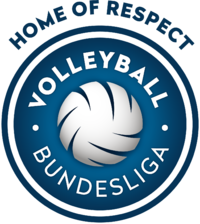German Volleyball Bundesliga (Men)

|
|
| Current season | Volleyball Bundesliga 2020/21 |
| sport | volleyball |
| abbreviation | VBL |
| Association | Volleyball Bundesliga |
| League foundation | 1974 |
| Teams | 12 |
| Title holder | Berlin Recycling Volleys (2019) |
| Record champions | VfB Friedrichshafen (13) |
| Website | volleyball-bundesliga.de |
The men's volleyball Bundesliga is the top division in German volleyball . The German champions have been determined in this competition since the 1974/75 season . The former German Volleyball League has been operating as the Volleyball Bundesliga since August 2014.
Current mode
The men's Bundesliga consists of eleven teams in the 2020/2021 season. There is no athletic relegation to the second division . The teams in the first eight places are qualified for the playoffs. The playoff quarter-finals were played in best-of-three mode , the playoff semi-finals and finals in best-of-five mode .
history
The first matchday in Bundesliga history took place on October 5, 1974. Eight teams were represented in the first season of the top German division. The founding members included SSF Bonn , 1844 Freiburg , USC Gießen , Hamburger SV , TSV 1860 Munich , USC Münster , GTRV Neuwied and VBC Paderborn-Petershagen . The championship was played in a league with no finals or play-offs . The Munich team won the first title in the new Bundesliga; the "lions" remained undefeated in all fourteen games. Two years earlier they had ended the series of successes at USC Münster with their first championship title. Neuwied and Paderborn were the first to be relegated. Today none of the first eight clubs are in the Bundesliga.
Hamburger SV, fourth at the premiere, dethroned TSV 1860 in 1976 and was able to defend the title a year later. The order of positions two to five in the table was also the same in both seasons: Münster ahead of Munich, Bonn and Giessen. In 1978 the "lions" replaced HSV at the top of the table.
In the 1978/79 season there was a new mode for the first time. After the fourteen games of the main round, the best four teams came into the championship round, the remaining four teams into the relegation round. TuS 04 Leverkusen benefited from the new regulation, climbing from third place to the championship title. The VBC 69 Paderborn won the runner-up title for the first time (and repeated this "eternal second" place in record series 1979/80, 1981, 1982, 1983, 1984 and 1985). The Hamburger SV, however - together with the YMCA Siegen - had to go into the second division. In the second year with championship round - 1979/80 - Munich again prevailed in 1860. This time, two teams from the then capital were represented in the top quartet with the SSF and TSV Bonn.
The Swimming and Sports Friends (SSF), who were German champions in the last season before the introduction of the Bundesliga, won the title again in the 1980/81 season. In the decisive game against Leverkusen, Bonn was only one point away from a defeat at 8:14 in the tie-break that would have helped Paderborn to the title. For the first time ten teams played in the first division, and in 1860 they failed to place in the top three for the first time. The newcomers Dürener TV and TVK Wattenscheid immediately relegated. In 1982 there was the tightest decision in the battle for the championship to date. With 30: 6 points each, USC Giessen (47:20) won one set more than VBC Paderborn (46:20). In the next two years the Hessians defended their title.
Then Hamburger SV started a series of successes. From 1985 to 1988 the Hanseatic League won four championships in a row. There was now a new mode. After two further attempts with a final round in the 1984/85 and 1985/86 seasons, the new title holder was determined for the first time through play-off games in the 1986/87 season . Right at the premiere, the Hanseatic people benefited from the new rule. After the main round Fortuna Bonn was still ahead, the future opponent in the final. The VBC Paderborn, one of the most traditional clubs, was relegated to the 2nd division.
In 1989, however, HSV lost to Bayer Leverkusen. At the bottom of the table there were two innovations. Eintracht Frankfurt was the first club in Bundesliga history to remain without a win in one season. The SV Türk Gücü Munich was even established early in the season relegated. Leverkusen defended its title against the up-and-coming Moerser SC and GSV Osnabrück suffered the same fate as the Munich Turks.
After that, the time of the successful series and title defense was over for the time being. In the next five years there were five different masters, all of whom won their first titles. First, a club from Munich triumphed in 1991 with TSV Milbertshofen . After reunification , the clubs from the former GDR were integrated into the Bundesliga. The first Eastern clubs in the league were the Post TSC Berlin , the SC Leipzig and the Schweriner SC . The first all-German champion was Moerser SC, who prevailed against SV Bayer Wuppertal in a North Rhine-Westphalian final . A year later Wuppertal was again defeated in the final. The championship trophy went to the East, to the SCC Berlin . The Düren TV remained as the third team without a win in one season. In 1994 SV Bayer celebrated. In the final series, which was held for the first time in the best-of-five mode, they defeated VfB Friedrichshafen . The two finalists were the opponents of the new champions ASV Dachau in 1995 and 1996 , before the duel from 1994 was reissued in 1997.
The twice defeated club from Lake Constance subsequently developed into the most successful German team. Friedrichshafen set a new record with five championships in a row. It was only when the league was expanded to eleven teams in the 2002/03 season that SCC Berlin was able to stop VfB. A year later there were twelve Bundesliga clubs and a new mode. After a main round there was - similar to the end of the 1970s - a division into championship round and a playdown round, now with six teams each. The teams that ended up in the table positions one to eight qualified for the playoff quarter-finals. Finally, the Charlottenburg team defended their title. The same system existed in 2005/06, but the SCC was eliminated in the semifinals by evivo Düren , who lost to VfB Friedrichshafen in three games in the final. The division of the league was then abolished and they returned to the proven playoff system. Düren reached the final again and resisted the defending champion for five games. But Stelian Moculescu's team became champions again and achieved the triple in 2007 with the third final victory against evivo thanks to the Champions League victory. The dominance of the new record champions continued in 2008 . Friedrichshafen remained unbeaten both in the championship and in the DVV Cup and won the double for the fourth time in a row. In the 2008/09 season, VfB Friedrichshafen was eliminated in the cup against TSV Unterhaching in the semifinals. Unterhaching was 3-1 in the cup final against Moerser SC Cup winner. The German championship was held between TSV Unterhaching and VfB Friedrichshafen. After competitive games, VfB Friedrichshafen became German champions for the fifth time in a row. In the 2009/10 season, VfB Friedrichshafen was eliminated from the cup against evivo Düren in the semi-finals. The cup winner was TSV Unterhaching, who defeated evivo Düren in the final. VfB Friedrichshafen and TSV Unterhaching were in the final of the German championship. Friedrichshafen prevailed 3-1 after four games and won the German championship for the sixth time in a row. In 2010/11 Friedrichshafen also won the championship title, this time with three victories in the finals against SCC Berlin. Cup winners 2011 were again the Hachinger with a 3-2 final win over Friedrichshafen. In 2011/12, the Berlin Recycling Volleys, as the successor team to SCC Berlin, became German champions for the fourth time after eliminating Generali Haching in the semi-finals in Friedrichshafen and in the finals. Friedrichshafen had to be content with winning the cup (3-0 in the final against Haching). In 2012/13 the championship title went to Berlin again, while Haching won the cup. In 2013/14 Berlin became champions for the third time in a row, while Friedrichshafen won the trophy. After this season, the traditional teams of Haching and Moers withdrew from the Bundesliga. In the 2014/15 season, VfB Friedrichshafen managed to win the double.
In the 2015/16 season, the Berliners finished the main round as first in the table. In the playoff final, Berlin prevailed against Friedrichshafen in three games and became German champions for the seventh time. In the 2016/17 season, Berlin won the playoff final again in three games against Friedrichshafen (first in the main round this year) and thus became German champions for the eighth time. In 2017/18 Berlin was second after the main round and won the playoff final against VfB Friedrichshafen, which was in first place. In contrast to the previous year, this required five games. Friedrichshafen had previously achieved the full number of points in the main round, both games were won in the quarter and semi-finals, so the three defeats in the finals were the only ones in the Bundesliga season. In 2018/19, after a mixed main round, Berlin was only third behind Friedrichshafen and the alpine volleyball games that had been playing in the Bundesliga since the previous year . Berlin won against the alpine volleyball with 3-1 games, so that there was the usual duel in the final, in which Berlin defended the title in five games.
In the 2019/20 season, a new Bundesliga record for the longest set was set on December 21, 2019 in Unterhaching (since the new rule was in place that points may not only be scored when you serve yourself). Hypo Tirol Alpenvolleys Haching won the third set of the game against SVG Lüneburg , led by captain Daniel Končal , with 50:48 points.
The 2019/20 season was canceled on March 12, 2020 due to the COVID-19 pandemic before the penultimate matchday of the main round. A championship title was not awarded, nor were there any relegated teams. It was the first time in the history of the Bundesliga that a season was ended prematurely.
media
The 2007/08 season saw live images of Bundesliga games for the first time. The VBL had signed a contract with the Internet provider sportdigital.tv , which also showed games from the basketball and handball Bundesliga . Every week, two selected matches from the men's or women's Bundesliga were broadcast live and in full. In addition, the games could be called up from an archive at any time. The fans could book a package for the entire season or watch individual games through pay-per-view .
There was also volleyball radio since the playoffs of the 2004/05 season. The internet broadcaster was founded in Düren and initially limited itself to the games from evivo Düren . The reporters later reported most of the men's Bundesliga matches on a conference call . In the 2007/08 season, broadcasting was stopped.
In the 2018/19 season there were regular broadcasts on Sport1 , the other games were shown on sporttotal.tv .
See also
Web links
- Official website of the Volleyball Bundesliga
- Bundesliga clubs
- German volleyball association
- VBL.tv - the Bundesliga internet TV
- Dynamic statistics - Bundesliga database of the Suhl fan club
- Eternal table 2014 (PDF file; 622 kB)
Individual evidence
- ↑ We make history. www.volleyball-bundesliga.de, December 21, 2019, accessed on December 22, 2019 .
- ↑ No further games: Volleyball Bundesliga ends season. Volleyball Bundesliga, March 12, 2020, accessed on March 12, 2020 .

